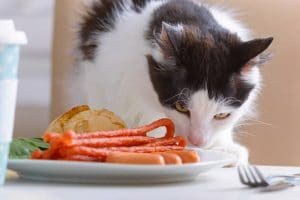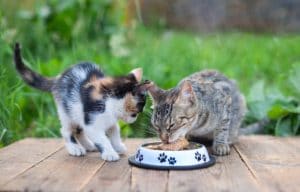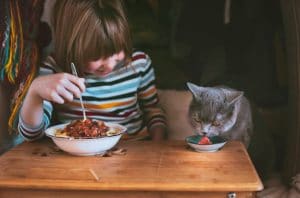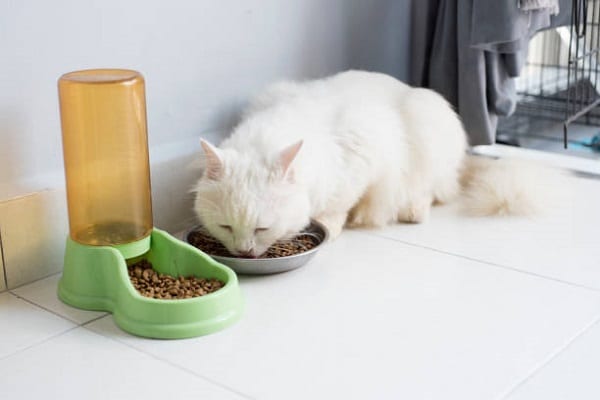
Many times when we’re eating, our cat friends, with their keen sense of smell, stare at us with expectancy as they hope we will share our scrumptious smelling food with them. Some more bolder cats might even reach a paw at our food for a small share. But, however much we might want to satisfy our felines, we must refrain from sharing our food with them as ingredients contained in our meals might be harmful to our cats.
The Allium Family
Onions, shallots, chives, and garlic are part of the allium family of foods and should never be fed to your cat. They contain a chemical that causes cats to lose red blood cells, and this can lead to anemia. Even in dehydrated or powdered form, never give these vegetables to your cat. These can weaken your cat, causing him to feel lethargic and even kill him. Furthermore, while you may not deliberately feed your cat onions or garlic, be mindful that you don’t feed him anything which contains those ingredients such as a piece of cooked meat which was seasoned with onions and garlic.
Alcohol
Alcohol is extremely harmful to cats. It can cause vomiting and diarrhea. It can also damage your cat’s liver and brain and lead to his death. Therefore, when drinking a glass of any alcoholic drink, be mindful that your curious cat does not take a sip.
Chocolate
While it’s commonly known that chocolate is lethal for dogs, many don’t realize that it can also be just as detrimental to cats. Chocolate can raise your cat’s temperature and can cause vomiting, and diarrhea. It contains a stimulant which can cause an irregular heart rate, seizures, and death. Moreover, chocolate is often sweetened with xylitol, an artificial sweetener that, if ingested, can cause your cat to suffer from low blood sugar, liver failure, and death.
Caffeine
Caffeine in large amounts can be deadly to cats. Caffeine poisoning can cause heart palpitation and restlessness. What’s worse is there is no cure for caffeine poisoning. Caffeine is found in many drinks such as coffee, tea, and energy drinks. Therefore, be sure to keep these away from your cat.
Most Baked Goods
Baked goods have baking soda and baking powder which are toxic to cats. You should also be wary of bread dough as the yeast it contains can cause your cat’s stomach to bloat and twist, and lead to the cat’s death. Additionally, yeast produces alcohol, and as we’ve covered, alcohol is fatal to cats. Baked goods can contain nutmeg and this spice is highly toxic to cats.
Raisins and Grapes
 While the reason is unknown, raisins and grapes can cause kidney failure in cats. Even in small quantities, they can make a cat sick.
While the reason is unknown, raisins and grapes can cause kidney failure in cats. Even in small quantities, they can make a cat sick.
Dairy Products
We can all recall watching cartoon cats lapping joyfully at a saucer of milk. However, cats cannot digest lactose and allowing your cat to drink milk or consume dairy in general can lead to digestive problems. Kittens can drink their mother’s milk, of course, and there are safe milk substitutes for kittens without mommas.
Salt
Salt is an indispensable spice that gives our food taste. However, for our cats, salt is quite poisonous. Among other symptoms, salt poisoning can cause a cat to vomit, be extremely thirsty, suffer seizures, and ultimately die.
Certain nuts and fruit
Nuts such as macadamia, walnuts, and pecans should never be given to your cat. They can cause lethargy and hyperthermia. Citric acid in citrous fruit can cause gastrointestinal problems. Cherries and plums are also harmful to your kitty. There is some disagreement about if almonds and avocados are safe for cats to eat. It is best to play it safe and keep these foods away from your cat, particularly avocado skin which is harmful.
Baby Food
Baby food is not harmless as it can contain any of the dangerous ingredients above, such as onions.
Bones
Bones are not harmful in and of themselves; however, when cooked, they can fall apart if a cat chews on them. The fragmented pieces can cause your cat to choke and, if swallowed, lead to internal lacerations.
Raw Eggs and Meat
 Even though cats are carnivorous, and big cats feast on raw meat, our domesticated cats should not eat raw meat or raw eggs as this can result in similar side effects as if we consumed raw meat and eggs such as E coli and salmonella poisoning, vomiting, and diarrhea. Be aware that many experts say that cats can eat raw meat as they are obligate carnivores, meaning they need the nutrients found in meat. Further, there are companies that sell raw meat for cats. If you want to feed your cat raw meat and are interested in a particular brand, be sure to talk it over with your veterinarian to help you make the best decision for your pet.
Even though cats are carnivorous, and big cats feast on raw meat, our domesticated cats should not eat raw meat or raw eggs as this can result in similar side effects as if we consumed raw meat and eggs such as E coli and salmonella poisoning, vomiting, and diarrhea. Be aware that many experts say that cats can eat raw meat as they are obligate carnivores, meaning they need the nutrients found in meat. Further, there are companies that sell raw meat for cats. If you want to feed your cat raw meat and are interested in a particular brand, be sure to talk it over with your veterinarian to help you make the best decision for your pet.
Candies
Keep all types of candy away from your cat. Sugar free candy contains xylitol, and as we’ve said above, this substance is deadly for our feline friends. Candy that contains sugar can lead to teeth problems, diabetes, and obesity. Though it’s unlikely that your cat will want gum, they are curious creatures, and if they do end up eating gum, it can be fatal to them.
Canned Tuna
Canned tuna should not be routinely given to cats. This may be surprising as many types of cat food are tuna flavored. This is because when tuna is prepared especially for cats, it’s safe for them to consume. However, tuna prepared for humans can lead to malnutrition and mercury poisoning in your cat when consumed in great quantities.
Dog Food
If you have a dog, be sure to keep your cat away from its food as much as possible. While a bite of dog food from time to time will not harm your cat, it is not formulated for cats and does not contain the vitamins your cat needs.
Keeping Problematic Foods away from Your Feline
While you may not intentionally feed your cats any of the dangerous foods described above, it is possible for your cat to reach these foods anyway. Clever cats can learn to open drawers and cabinets to get their favorite treats. Therefore, be sure to keep any dangerous foods out of your cat’s reach. Do the same with his cat treats as too many can lead to obesity. If despite your diligence, your cat eats something he shouldn’t and is experiencing side effects, call the ASPCA Animal Poison Control Center at 888-426-4435.
Discourage your cat from wanting your food. Don’t let him climb on the counter when you’re cooking, and resist the urge to feed him table scraps.
In attempting to satisfy the greed of our cat friends, we might end up hurting them. Therefore, however much we do not want to upset their feelings, we must simply stick to the foods that are prepared for them. Our cats bring joy to our lives. Let’s keep them healthy and with us for as long as we can.





